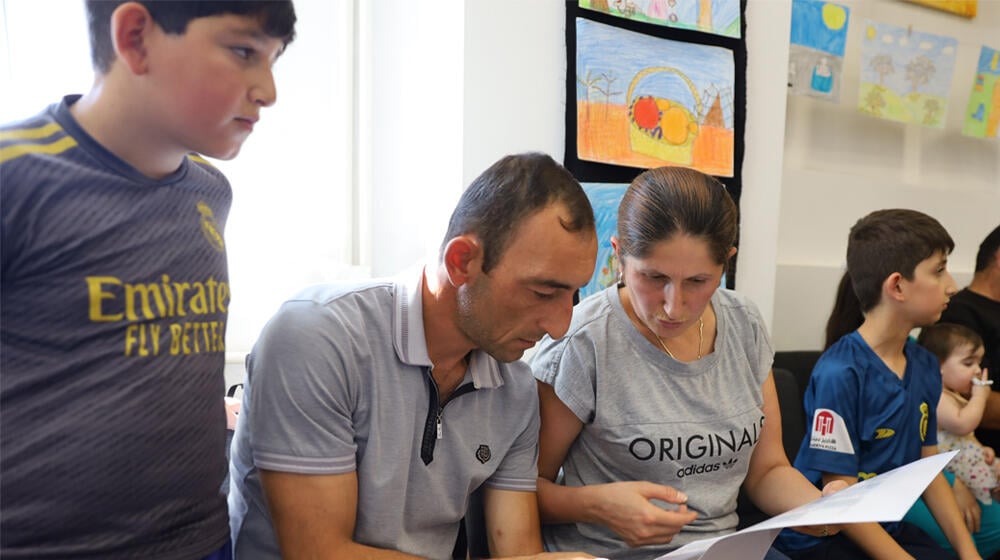The "Four Walls and DNA Chain" event at the Khachmeruk educational advisory center of the Shirak Diocese of the Armenian Apostolic Church gathered six large families to enhance mutual understanding and collaborative decision-making through games and discussions.
As part of the “EU 4 Gender Equality: Together Against Gender Stereotypes and Gender-Based Violence” programme (phase 2), and in collaboration with the United Nations Population Fund (UNFPA) and the WCC Armenia Round Table Foundation, families from Shirak province of Armenia and Nagorno-Karabakh participated in the event held on August 14, 2024.
Chichyan family from Nagorno-Karabakh attended the event in full: father Sargis, mother Lianna, their three school-age children, and baby Mher, born in Gyumri a few months ago. Despite the activity and noise, little Mher slept peacefully for most of the event in the arms of his parents.
"My priority is for my family to be healthy and safe," said Sargis Chichyan, 39. When asked if he helps with household chores, he replied, "Let my wife say it herself."

Lianna, 36, said, "Actually, my husband helps a lot. He takes great care of the children and looks after our newborn son while I handle the housework. We complement each other." She added, "I don't do much; I'm mostly at home with the children while my husband works."
Sargis interjected, "She’s wrong to say she doesn’t do much; in reality, she’s doing the most important work. Raising a child is a significant job, and I try to support my wife so she doesn’t have to do it all alone."
The first part of the event was dedicated to promoting cooperation between family members. At this stage, games were designed to explore and strengthen bonds and communication skills among family members.
"We place great importance on efforts to strengthen and empower families, ensuring that each member is heard, protected, and has the opportunity to realize their potential. I sincerely hope that, through this programme and with the support of church priests and social workers, we can continuously achieve an equal distribution of care within families, foster mutual respect, and create a healthy environment," said Taguhi Harutyunyan, the "EU 4 Gender Equality" programme coordinator at the UNFPA Armenia office.
Laura Aghajanyan, programme coordinator at the WCC Armenia Round Table Foundation, highlighted the long-standing successful collaboration with UNFPA Armenia, which focuses on enhancing family well-being and preventing violence through the involvement of church priests and social workers.
In the second part of the event, the games were designed to enhance family members' flexibility and quick decision-making skills.
Zaruhi Tonoyan, Programme Specialist for UN Women in Armenia, emphasized: "A healthy family is one where every member feels safe, rights are protected, and any kind of violence is absent. In such a family, everyone can voice their opinion and participate in decision-making. Given that family members may have different needs, special approaches are necessary to ensure everyone has the opportunity to realize their potential. It is not solely the responsibility of one person; mutual support is crucial because the result of collective effort is more significant."
The final part of the event focused on raising awareness about children's rights. Participants engaged in a discussion on the Convention on the Rights of the Child, examining specific cases of violated rights and emphasizing the importance of their protection.
"When the union of a man and a woman is grounded in love and care, it leads to equality. Ultimately, the driving force of the family is love, which encompasses mutual respect, loyalty, and shared decision-making," said father Makar Galamdaryan.
During the first phase of the “EU 4 Gender Equality: Together Against Gender Stereotypes and Gender-Based Violence” programme, approximately 650 young Armenian women and men from Shirak, Tavush, and Lori provinces improved their understanding of gender equality and violence prevention in families through counseling meetings and events with priests and social workers from the Armenian Apostolic Church. Priests and social workers actively worked in their communities after the capacity-building training sessions on men’s engagement and responsible fatherhood conducted in partnership with the WCC Armenia Round Table Foundation.
This publication was produced within the “EU 4 Gender Equality: Together against gender stereotypes and gender-based violence" programme (phase 2), funded by the European Union, implemented jointly by UN Women and UNFPA. Its contents are the sole responsibility of UN Women and UNFPA and do not necessarily reflect the views of the European Union.
Mari Mkhitaryan
Photos: Mari Mkhitaryan/UNFPA


